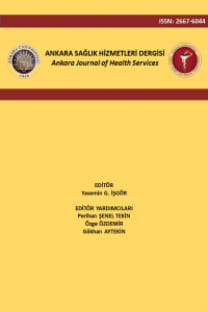Postoperatif Ağrıda Transdermal Fentanil Kullanımı
Transdermal fentanil, postoperatif ağrı, tramadol
USE OF TRANSDERMALFENTANYL FOR POSTOPERATIVEPAIN
Transdermal fentanyl, postoperative pain, tramadol,
___
- Jeal W, Benfield P. Transdermal fentanyl. A review of its pharmacological properties and therapeutic efficiacy in pain control. Drugs 1997;53:109-38
- Houmes RJM, Voets MA, Verkaaik A, Erdmann W, Lachmann B. Efficiacy and safety of tramadol versus morphine for moderate and severe postoperative pain with special regard to respiratory depression. Anesth Analg 1992;74:510-514.
- Vickers MD, Paravicini D. Comparison of tramadol with morphine for postoperative pain following abdominal surgery. Eur J Anaesth 1995;12:265-271.
- Vickers MD, O’ Flaherty D, Szekely SM, Read M, Yoshizumi J. Tramadol: Pain relief by an opioid without depression of respiration. Anaesthesia 1992; 47:291-6.
- Bulow HH, Linnemann M, Berg H, Lang-Jensen T, LaCour S, Jonsson T. Respiratory changes during treatment of postoperative pain with high dose transdermal fentanyl. Acta Anaesthesiol Scand 1995;39:835-9.
- Broome IJ, Wright BM, Bower S, Reilly CS. Postoperative with transdermal fentanyl following lower abdominal surgery. Anaesthesia 1995;50:300-3.
- Sevarino FB, Naulty JS, Sinatra R, Chin ML, Paige D, Conry K, Silverman DG. Transdermal fentanyl for postoperative pain management in patient recovering from abdominal gynecologic surgery. Anesthesiology 1992;77: 463-6.
- Sandler AN, Baxter AD, Katz J, Samson B, Friendlander M, et al. A double-blind, placebo-controlled trial of transdermal fentanyl after abdominal hysterectomy. Anesthesiology 1994;81:1169-80.
- Grond S, Radbruch L, Lehmann KA. Clinical pharmacokinetics of transdermal opioids: focus on transdermal fentanyl. Clin Pharmacokinet 2000;38:59-89.
- Esteve M. Transcutaneous fentanyl. Can J Anesth. 1994;42:195-217
- Lehmann LJ, De Sio JM, Radvany T, Bikhazi GB. Transdermal fentanyl in postoperative pain. Reg Anesth 1997;22:24-8.
- Yayın Aralığı: Yılda 2 Sayı
- Başlangıç: 2000
- Yayıncı: Ankara Üniversitesi
Yıldız GÜNEY, Ayşe BİLGİHAN, Ulukavak ÇİFTÇİ TANSU, Filiz ÇİMEN, Özgür COŞKUN
S İNAN, T ÖZGÜDER, H.S. VATANSEVER, K ÖZBİLGİN, M. SANCI, S. SAYHAN
Normal ve Sezeyan Doğumlarda Maternal ve Umbinikal Kordon Karnında Endotelin-1 Düzeyleri
BÜLBÜL BAYTUR Yeşim, Cevval ULMAN, Göker TAMA Aslı, Ahmet VAR, Hüsnü ÇAĞLAR
Postoperatif Ağrıda Transdermal Fentanil Kullanımı
Ulukavak ÇİFTÇİ TANSU, Yıldız GÜNEY, Ayşe BİLGEHAN, Filiz ÇİMEN
Epidermoid Baş-Boyun Kanserlerinin Tedavisinde Hiperfraksiyone Radyoterapi Sonuçları
Ayşe HİÇSÖNMEZ, Yıldız GÜNEY, Ayşen DİZMAN, Nalça ANDRIEU MELTEM
Endometriyal Hiperplazilerin Tedavisinde Vajinal Progestoron Jelin Etkinliği
Bülbül BAYTUR YEŞİM, Semra ORUÇ, Barış ÇOBAN, Fatma ESKİCİOĞLU, Rıza KANDİLOĞLU Ali
